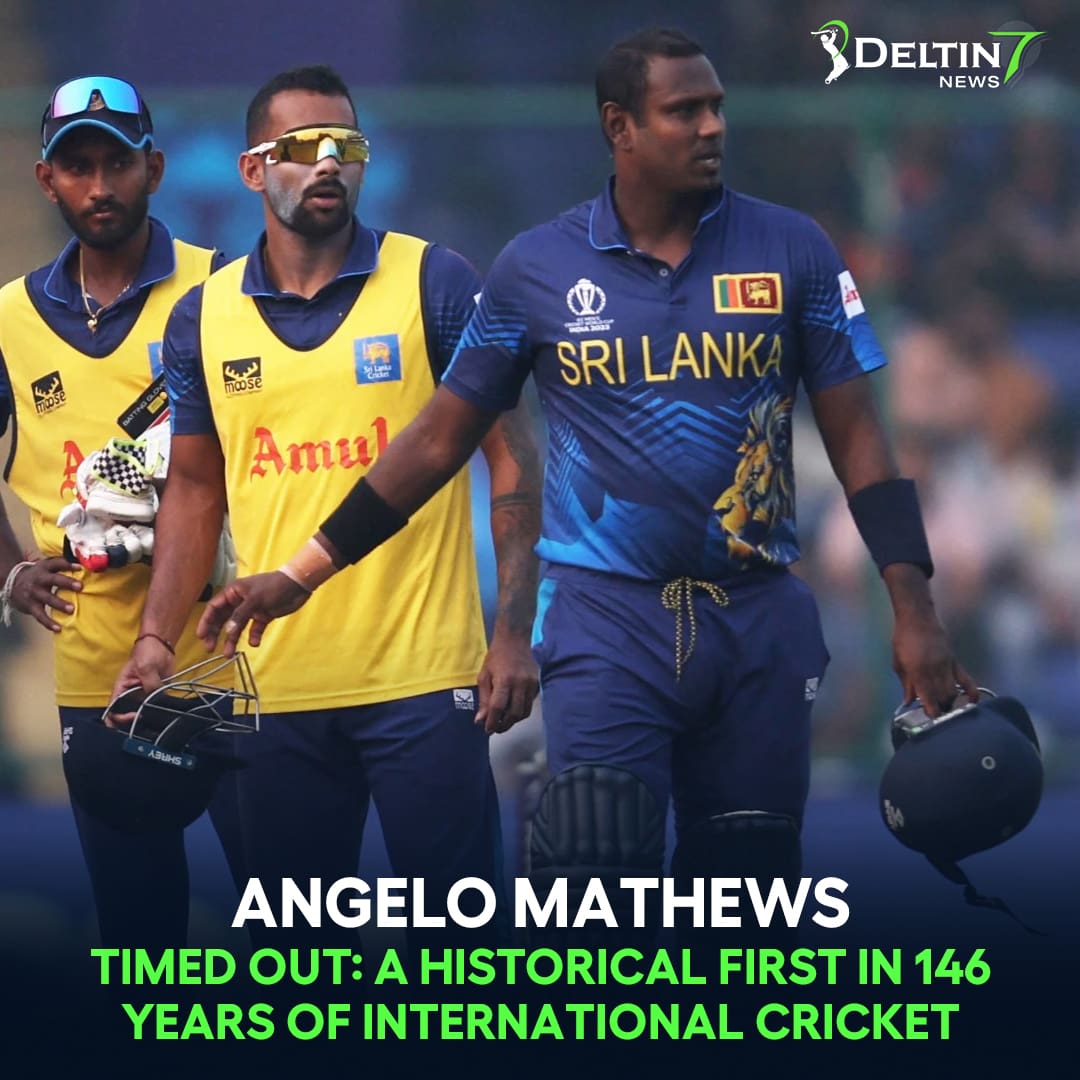
In a historic turn of events during the Sri Lanka vs Bangladesh World Cup clash in Delhi, Angelo Mathews became the first batter in the history of international cricket to be given out ‘Timed Out.’ This rare and controversial dismissal has sparked discussions around the validity and fairness of the existing rules. While the incident itself has garnered attention, it also raises questions about a similar situation involving Sourav Ganguly in 2007. In this article, we will delve into the details of Mathews’ dismissal, examine the current laws governing the ‘Timed Out’ rule, and explore the need for potential reforms.
Angelo Mathews walked in to bat at No.6 after the fall of Sadeera Samarawickrama’s wicket. However, before facing a single ball, he was timed out by the umpires following an appeal by Bangladesh captain Shakib Al Hasan. Mathews had taken more than two minutes to take strike due to an issue with his helmet strap. Despite his attempts to rectify the problem, the umpires upheld the appeal, leaving Mathews dismayed and spectators bewildered. This incident marks the first time a batter has been dismissed according to the ‘Timed Out’ law in international cricket.
The rule governing ‘Timed Out’ dismissals in international cricket is outlined in the ICC Men’s Cricket World Cup 2023 playing conditions. According to the rule, the incoming batter must be ready to receive the ball within two minutes of dismissal or retirement, unless Time has been called. Failure to meet this requirement results in the incoming batter being given out. The purpose of this rule is to prevent time-wasting tactics and maintain the flow of the game.
While the ‘Timed Out’ rule serves a valid purpose, Mathews’ dismissal highlights the need for potential reforms. In Mathews’ case, his delay in taking strike was due to an unforeseen equipment issue – a broken helmet strap. Although he signaled for a new helmet, the law provides no leeway for such circumstances, potentially putting batters at risk. It is crucial to strike a balance between maintaining the integrity of the game and ensuring the safety and fairness of the players.
The incident involving Sourav Ganguly in 2007 during a Test match against South Africa brings forth intriguing parallels. Ganguly narrowly avoided being timed out after taking more than six minutes to step onto the pitch. The confusion arose due to the absence of Sachin Tendulkar, who was not allowed to take the field, and VVS Laxman, who was in the shower. However, in this case, South African captain Graeme Smith chose not to appeal, allowing Ganguly to bat. The contrasting outcomes between Mathews and Ganguly raise questions about consistency and the role of the fielding captain in determining the application of the ‘Timed Out’ rule.
To address the potential discrepancies and power concentration in the hands of the fielding side, it is crucial to empower the umpires in deciding the validity of ‘Timed Out’ appeals. Currently, once an appeal is made, the umpires have limited authority to overrule the decision, even if there are exceptional circumstances or emergencies. Granting umpires the discretion to assess the appeal and consider unforeseen factors would ensure a more consistent and fair application of the rule.
In light of Mathews’ dismissal and the issues it highlights, it is necessary to reevaluate the ‘Timed Out’ rule. One possible reform could involve allowing a reasonable grace period for batters to address unforeseen equipment issues without risking dismissal. Additionally, the role of the fielding captain in determining the appeal’s validity could be minimized, shifting the decision-making authority back to the umpires. These reforms would strike a balance between maintaining the game’s integrity and prioritizing player safety and fairness.
While Mathews’ dismissal has generated controversy, it also sheds light on the importance of evolving cricket rules to adapt to the changing dynamics of the game. As cricket continues to evolve, it is crucial to review and update laws to ensure fairness, consistency, and player welfare. The rare occurrence of a ‘Timed Out’ dismissal serves as a catalyst for discussions on rule reforms and highlights the need to strike the right balance between tradition and progress.
Angelo Mathews’ ‘Timed Out’ dismissal has etched his name in the history of international cricket, marking a significant milestone. This controversial incident prompts a reevaluation of the ‘Timed Out’ rule and calls for potential reforms to balance the game’s integrity and players’ safety. By empowering umpires to make fair and consistent decisions and allowing a grace period for unforeseen equipment issues, the rules can be updated to align with the modern game. As cricket progresses, it is vital to adapt and refine laws to ensure a level playing field for all participants.
Desert Vipers vs Dubai Capitals ,DV vs DC T20 Match Bold Prediction for Today's Exciting…
MI Cape Town vs Paarl Royals, MICT vs PR T20 Match Prediction, Today's Thrilling Match…
Rangpur Riders vs Khulna Tigers BPL T20, Today Match Prediction & Expert Team Review RGR…
Pakistan vs West Indies, PAK vs WI 2nd Test Match Prediction, Analysis & Thrilling Review…
Sydney Sixers vs Sydney Thunder BBLT20, Today Thrilling Match Prediction & Detailed Review SYS vs…
Australia vs England Women Ashes T20, Expert Match Prediction & Winning Insights AUS-W vs ENG-W…